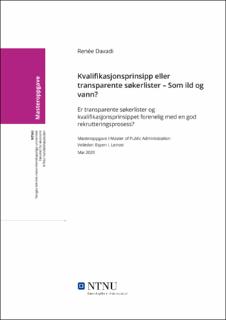| dc.contributor.advisor | Leirset, Espen I. | |
| dc.contributor.author | Davadi, Renée | |
| dc.date.accessioned | 2021-09-14T17:14:27Z | |
| dc.date.available | 2021-09-14T17:14:27Z | |
| dc.date.issued | 2020 | |
| dc.identifier | no.ntnu:inspera:55684094:22390908 | |
| dc.identifier.uri | https://hdl.handle.net/11250/2777133 | |
| dc.description.abstract | Denne masteroppgaven søker å belyse hvordan offentlighetslovens krav om offentlig søkerliste affekterer rekrutteringen av toppledere til offentlig sektor. Lovbestemmelsen om offentlige søkerlister er hyppig gjenstand for debatt, mye fordi den forsøker å balansere to hensyn som ofte oppleves som motstridende. Det er i alles interesse at nøkkelstillinger i offentlig sektor bekles av de best kvalifiserte kandidatene, men det er også viktig å sikre ansettelsesprosesser som tåler dagens lys. På sitt beste sikrer offentlighetsloven demokratisk kontroll og transparens, på sitt verste forhindrer den at de beste kandidatene søker på stillinger i det offentlige.
I denne masteroppgaven spør jeg hvilken effekt kravet om transparens og åpenhet har på rekrutteringen til offentlig sektor, og om det er utslagsgivende for å få et godt tilfang av kvalifiserte kandidater. Problemstillingen har i løpet av skriveprosessen blitt ytterligere aktualisert gjennom ansettelse av ny sjef for oljefondet, denne aktualiseringen har også bidratt til å tydeliggjøre hvor lite forskning som foreligger på feltet. Gjennom denne oppgaven ønsker jeg å belyse hvorfor disse spørsmålene fortjener økt oppmerksomhet, i tillegg til at jeg forsøker å tette deler av hullet i litteraturen på området.
Masteroppgaven er en komparativ studie som bygger på to empiriske datakilder; semistrukturerte kvalitative intervjuer og komparative søkertall fra 96 rekrutteringsprosesser i offentlig og privat sektor. Jeg benytter informanter som arbeider med topplederrekruttering med erfaring fra både offentlig og privat sektor. Det teoretiske fundamentet for oppgaven bygger på transparens, kvalifikasjonsprinsippet og meritokratiske hensyn, samt deliberasjon.
Studien finner at offentlige søkerlister har en klar innvirkning på hvorvidt kandidater søker på en offentlig topplederstilling, men at det i liten grad påvirker om de tar kontakt med rekrutteringsselskapet eller oppdragsgiveren for å drøfte sitt kandidatur. Jeg argumenterer her for at det i stor grad skyldes kostnaden den enkelte opplever ved å offentliggjøre kandidaturet sitt, i de tilfellene vedkommende ikke innstilles til den aktuelle stillingen. Mine funn tyder på at en direkte følge av dette er at den offentlige rekrutteringsprosessen tilpasses for å få et best mulig kandidattilfang, med den konsekvens at de offentlige søkerlistene utviser begrenset transparens. | |
| dc.description.abstract | This master's thesis seeks to elucidate how the requirements of the Freedom of Information Act on public list of applicants affect the recruitment of top executives to the public sector. The statutory provision on public search lists is frequently the subject of debate in Norway, much because it attempts to balance two considerations that are often perceived as contradictory. It is in everyone's interest that key positions in the public sector are held by the best qualified candidates, but it is also important to secure recruitment processes that can withstand the light of day. At its best, the Freedom of Information Act ensures democratic control and transparency, at its worst, it prevents the best candidates from applying for public office positions.
In this master's thesis I ask what effect the requirement of transparency has on the recruitment to the public sector, and whether it is decisive to get a good number of qualified candidates. During the writing process, the issue has been further raised through the appointment of a new head of the Norwegian Oil Fund, which has also helped to clarify how little research is available in the field. Through this paper, I want to elucidate why these questions deserve increased attention, as well as trying to close parts of the gap in the literature in the field.
The thesis is a comparative study based on two empirical data sources; semi-structured qualitative interviews and comparative applicant numbers from 96 public and private sector recruitment processes. I use informants who work with executive management recruitment with experience from both the public and private sectors. The theoretical foundation of the thesis is based on transparency, the qualification principle and meritocratic considerations, as well as deliberation.
The study finds that the public list of applicants has a clear impact on whether candidates apply for a public senior management position, but that it has little effect on whether they contact the recruitment company or the client to discuss their candidacy. I argue that it is largely due to the cost the individual experiences by publishing their candidacy, in cases where they are not nominated for the position in question. My findings suggest that a direct consequence of this is that the public recruitment process is adapted to obtain the best possible candidate recruitment, with the consequence that the public applicant lists have limited transparency. | |
| dc.language | | |
| dc.publisher | NTNU | |
| dc.title | Kvalifikasjonsprinsipp eller transparente søkerlister – Som ild og vann? | |
| dc.type | Master thesis | |
